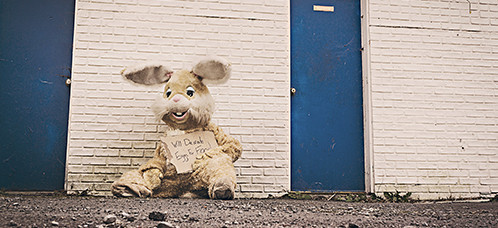Why Character Tropes Aren’t Getting The Job Done

Image courtesy of Gratisography
If you’re having a problem with the characters in your writing, or in creating meaningful characters in the first place, it’s probably because you’re falling into the trap of ease and convenience that is the character trope. Fucking stop it. A trope isn’t going to get the job done. Alone, it’s just a bare bones framework. It’s an unfinished house for loitering garden gnomes. Authenticity is the only thing that is going to save those sons of bitches. In order for a character to live, we have to risk making them real. All of them, in ways that are occasionally unpopular. If not, you’ve just got one or two crazy pricks running around in predictable patterns railing at cardboard cutouts with no emotional payoff.
As a society we want to label or quantify everything and everyone. It’s safe, but it’s not reliable. It only works on a surface level. As a storytellers, we need to know our characters better than that. We need to know ourselves better than that. We have to ask and answer ugly questions in unflattering ways. It’s a terrifying proposition to balance sympathy and unabashed realism, but that’s what we signed up for- the exposure wrapped in an enigma of bullshit, sandwiched between a couple slices of vulnerability and charm. The written word is the most intimate of storytelling mediums. It delves, the most blatantly, below the skin of the world. In order to do that justice, we have to be prepared to follow it down and to be honest about what we find. Anything else smells like fraud.
To believe in the lie, it has to reflect the truth. We both want and need to believe in the lie. And the best lies don’t even ping on the radar. They stroll right past us swaddled in God’s-honest. You are now a time honored creator of this stuff. It is your job to get it right. It’s swell to know what your character’s favorite color is or what their preferred brand of cereal is, but knowing things about someone doesn’t constitute knowing them. We have the opportunity to ask our characters all of the questions we want to ask strangers, but don’t. Ask your characters the questions that you’re afraid to ask yourself. Look for what is not congruent. Look for the conflict between answers and actions. In the interest of full disclosure, here are ten of my favorites:
Describe the last time that you were happy.
What are you afraid of?
What is the last lie that you told? The last thing you covered up?
What do you think it says about you?
Do you like yourself?
What is the last action you took out of self preservation? Last selfless action?
What do you want out of your life?
What are you proud of?
Fill in the blanks. When you say ______, you really mean _______.
Why would you give me the answers to any of these questions? Be specific.
A story can be many things. Anything really, but a character CAN NOT be an inauthentic representation of his or her own nature without weakening the fundamental structure of what you’re trying to achieve. I don’t mean that every character has to be strong or that they all have to be strong in the same way. I mean that we have to do the work and make the difficult decisions that allow them to be more than place fillers or props. They have to reveal themselves. Take away the tropes or turn them on their heads. Our skills as writers hold true, when our characters are real enough, unexpected enough, to make us stop caring that it’s fiction.
The post Why Character Tropes Aren’t Getting The Job Done appeared first on .



